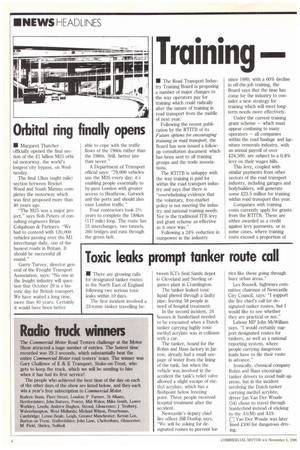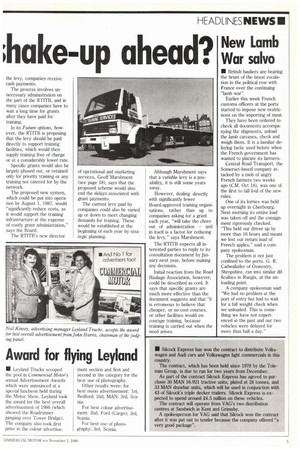Training ;hake-up ahead?
Page 6

Page 7

If you've noticed an error in this article please click here to report it so we can fix it.
• The Road Transport Industry Training Board is proposing a number of major changes to the way operators pay for training which could radically alter the nature of training in road transport from the middle of next year.
Following the recent publication by the RTITB of its Future options for encouraging training in road transport, the Board has now issued a followup consultation document which has been sent to all training groups and the trade associations.
The RTITB is unhappy with the way training is paid for within the road transport industry and says that there is "overwhelming evidence that the voluntary, free-market policy is not meeting the industry and national training needs. Nor is the traditional ITB levy and grant scheme as effective as it once was."
Following a 24% reduction in manpower in the industry since 1980, with a 60% decline in off-the-job training, the Board says that the time has come for the industry to consider a new strategy for training which will meet longterm needs more effectively.
Under the current training grant scheme — which must appear confusing to many operators — all companies within the road haulage and furniture removals industry, with an annual payroll of over 224,500, are subject to a 0.8% levy on their wages bills.
This levy, coupled with similar payments from other sectors of the road transport industry, including garages and bodybuilders, will generate some 223.5 million for training within road transport this year.
Companies with training costs currently apply for grants from the RTITB. These are either awarded as a credit against levy payments, or in some cases, where training costs exceed a proportion of the levy, companies receive cash payments.
The process involves unnecessary administration on the part of the RTITB, and in many cases companies have to wait a long time for grants after they have paid for training.
In its Future options, however, the RTITB is proposing that the levy should be paid directly to support training facilities, which would then supply training free of charge or at a considerably lower rate.
Specific grants would also be largely phased out, or retained only for priority training or any training not catered for by the network.
The proposed new system, which could be put into operation by August 1, 1987, would "significantly reduce costs, as it would support the training infrastructure at the expense of costly grant administration," says the Board.
The RT1TB's new director of operational and marketing services, Geoff Marshment (see page 18), says that the proposed scheme would also end the delays associated with grant payments.
The current levy paid by companies could also be varied up or down to meet changing demands for training. These would be established at the beginning of each year by strategic planning. Although Marshment says that a variable levy is a possibility, it is still some years away.
However, dealing directly with significantly fewer Board-approved training organisations, rather than up to companies asking for a grant each year, "will take the chore out of administration — and in itself is a factor for reducing the levy," says Marshment.
The RTITB expects all interested parties to reply to its consultation document by January next year, before making any decisions.
Initial reaction from the Road Haulage Association, however, could be described as cool. It says that specific grants are much more effective than the document suggests and that "it is erroneous to believe that cheaper, or no-cost courses, or other facilities would encourage training, because training is carried out when the need arises.




















































































